This service is funded through the Children and Youth Behavioral Health Initiative, a statewide initiative that invests in youth mental health.
SAN DIEGO — California's second-largest school district and the San Diego YMCA are expanding resources to support youth mental health.
The two organizations recently received funding through the Children and Youth Behavioral Health Initiative, a statewide initiative that invests in youth mental health.
State officials have donated $67 million to 99 organizations in 30 counties to expand mental health and wellness services for children, youth and young adults in the state. This funding is provided through a partnership between the California Department of Health Services and the Mental Health Services Oversight and Accountability Board.
“By investing in these programs, we can make a real difference in the lives of California's children and youth,” DHCS Director Michelle Barth said in a statement.
SDUSD opens on-campus wellness center for 2024-25 school year
San Diego Unified will use a $720,000 state grant awarded in early March to establish five new family wellness centers. Information services specialist Tara McNamara said the district received $750,000 from the same source in January to open wellness centers at six high schools and two middle schools.
The latest round of funding will support the district's FamilyWell initiative. It is a “comprehensive, culturally responsive family health program that supports access and access to behavioral health and other community resources,” McNamara said.
The effort focuses on prevention and early intervention to connect children and their families to resources before problems become serious, McNamara said.
The new Family Wellness Center will provide services such as short-term case management, community education, support networks, family assistance, and engagement with at-risk students. The goal is to proactively address the mental health and well-being of transitional kindergarten through 8th grade families and students.
District officials will this spring select five campuses to open family wellness centers during the 2024-25 school year.
Next school year, San Diego Unified plans to open wellness centers at two high schools and six middle schools. State funding will support wellness center coordinators at each of these locations, McNamara said.
McNamara said the coordinators will focus on prevention and early intervention and help students access behavioral health services. They provide guidance, share health campaigns and help students develop life skills.
San Diego YMCA aims to close the preventive care gap
Meanwhile, LMFT's Christina Halmai-Gillan said the funding will help fill a gap in early intervention mental health care at the San Diego County YMCA.
The YMCA will use part of the grant, $750,000, to provide support to parents of youth who have experienced complex trauma, such as abuse or an unsupportive environment. In addition to symptoms such as low self-esteem and heightened fight-or-flight states, trauma in early childhood can lead to difficulties building relationships with others, which can manifest as behavioral difficulties, Harmay Gilan said. Ta.
This training is intended to enable adults to model behavior and to help children acquire the skills necessary for self-regulation.
Caregivers are also screened for additional needs, such as food and housing instability, and connected to relevant resources. In addition to training and support, Harmaygilan hopes the sessions will help carers build connections with others going through similar experiences.
“This will help caregivers normalize that 'you are not alone,'” Harmay Gilan said.
She said programs like this are critical because San Diego faces a shortage of mental health professionals.
One reason her team chose this particular early intervention style is because it relies on adults rather than therapists.
“Good mental health infrastructure doesn't exist,” Harmaygilan said. “We also don’t currently have enough therapists to meet the need.”
Youth mental health crisis deepens
The Centers for Disease Control and Prevention reported that nearly one-third of students experienced poor mental health in 2021, and more than one in five students made a serious suicide attempt.
Additionally, the World Health Organization revealed in 2021 that one in seven 10- to 19-year-olds experience a mental disorder.
According to the state health department, research shows that 50% of mental health conditions become apparent by age 14 and 75% by age 24. However, not many young people receive the support they need early on.
According to the state, 66% of children with depression in California are not receiving treatment.
Learn more about California's Youth Behavioral Health Initiative.
Watch related: Inside the Rady Children's Mental Health Emergency Department


